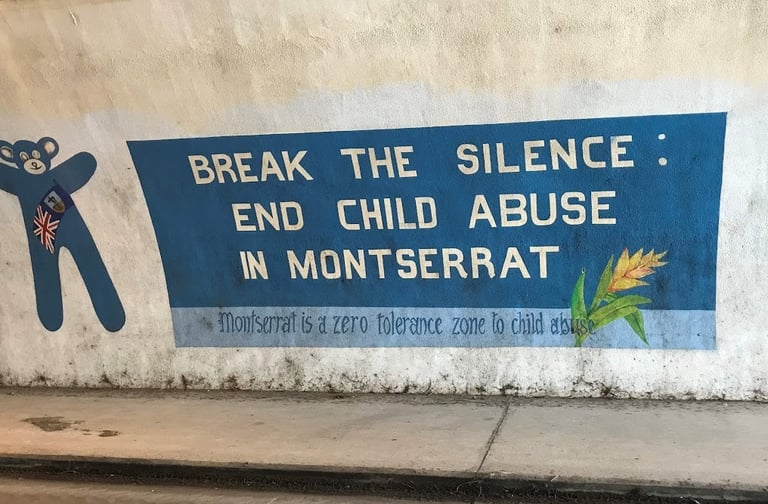Tackling child sexual exploitation in the Overseas Territories
In October 2020 the lawyer for a convicted child rapist in Gibraltar announced that he was appealing his client’s conviction. He is claiming judicial errors, that the wrong charges were applied, and that evidence was used that should have been excluded.
NEWS FROM THE OVERSEAS TERRITORIES
In October 2020 the lawyer for a convicted child rapist in Gibraltar announced that he was appealing his client’s conviction. He is claiming judicial errors, that the wrong charges were applied, and that evidence was used that should have been excluded. But he is also appealing the sentence. The 20-year sentence for raping a pre-teen girl is according to him “manifestly excessive”.
But is it? This article isn’t going to be a discussion of this particular case, but there is a reason why the Courts need to be able to hand out long sentences, and it isn’t just to isolate the offender. Kelly Hunt, the executive director of Bermuda’s Coalition for the Protection of Children, explained this in relation to her own island in an article last year. It is to send out a clear signal about the severity of the offence and to make reporting the allegations worthwhile. She wrote: “Ninety-five per cent of all cases of child abuse in Bermuda are ignored or not reported, according to the Police Service. A lengthier sentence would encourage victims and offended families to come forward and speak up against perpetrators with less fear. It is promising that the courts understand that offences may be of such severity that penalties of up to 20 years may be appropriate.”
Child Safeguarding is a big issue within island territories, where population size and lack of capacity make most human rights issues a challenge to address. In relation to the OTs, Child Sexual Exploitation has been a priority for FCO (now the FCDO) for a few years now. Since 2016 it has been providing enhanced support for revising legislation, strengthening multi-agency working and helping territories build the capability of frontline staff.
The OTs have themselves pledged to strengthen their response to the issue, including commitments to the highest standards of protection for children, the development of National Child Safeguarding Action Plans and a zero-tolerance approach to abuse. The issue began to appear in the FCDO’s annual Human Rights and Democracy Report in 2015, and progress has been reported regularly ever since. It is expected to be a key agenda Item at the next Joint Ministerial Council meeting.
The new focus on child safeguarding began after the Daily Mail published exaggerated claims of child sexual exploitation on St Helena. These were eventually discredited but the Government did acknowledge that in its reporting to the UN it had understated the scale of child abuse on the island. An independent inquiry (the Wass Inquiry) was set up by the UK to identify what needed to be done and this led to additional resources being allocated to St Helena social services by DFID and also to Montserrat, which is the other aid-dependent OT.
The 2015 FCO Human Rights and Democracy report summarised how they had so far supported the OTs on child safeguarding. This included:
· Child safeguarding reviews conducted in Montserrat, Pitcairn and Tristan da Cunha
· A UK Children’s Services professional, commissioned by the Cayman Islands to look at raising standards in safeguarding.
· The Ascension Island government appointing its first full-time social worker and introduced criminal record checks for anyone wishing to volunteer or work unsupervised with children.
· Anguilla passing its flagship domestic violence legislation and the Royal Anguilla police force undertaking family liaison training, supported by FCO. An interagency child protection protocol CPP was introduced.
· The British Virgin Islands, Montserrat and St Helena successfully created public awareness campaigns around child safeguarding and protection by drawing on expertise from the United Nations Children’s Fund (UNICEF) and NGOs.
· The Turks and Caicos Islands passed four Organisations of Eastern Caribbean States (OECS) model family law bills in children care, protection and adoption
· The Government of Bermuda partnered with a local NGO to deliver child sexual abuse training across the island.
· The Falklands Islands government produced a draft memorandum of understanding and a child safeguarding roadmap
· The majority of the OTs also participated in a child sexual exploitation online investigation training workshop as part of Operation Guardian in Miami
In 2017 the FCO’s report stated that it had continued to provide technical support, including child safeguarding training for police, teachers and social workers, and assistance to enhance safeguarding systems and legal frameworks. In 2018 it said it had supported the Cayman Islands to improve their multi-agency response and to establish a helpline. In the Turks and Caicos Islands it had helped the police enhance its capability on child safeguarding, and establish a child protection centre designed to provide multi-agency support to vulnerable children.


